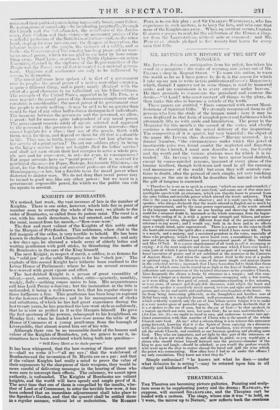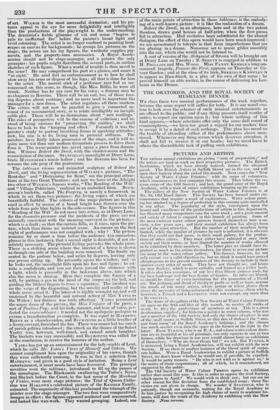THEATRICALS.
THE Theatres are becoming picture galleries. Painting and sculp- ture seem to be supplanting poetry and the drama; RAPHAEL, we suppose, will succeed SHAKSPEARE, and the Thespian cart be loaded with a cartoon. The stage, whose aim it was "to hold, as 't were, the mirror up to Nature," now reflects back the creations of art.. %%Tunis is the most successful dramatist; and his pic- tures appeal to the eye far more delightfully and intelligibly than the productions of the playwright to the understanding. The dramatist's feeble glimmer of wit and sense "begins to pale its ineffectual fire' before the painter's broad light and vivid colouring. The artist is no longer confined to painting land- scapes on canvas for backgrounds ; he groups his pictures on the stage; the actors are his lay figures, the wardrobe supplies pig- ments, and the property-man accessories. A Royal Acade- mician should now be -stage-manager, and a painter the only prompter: his pupils might distribute the several parts, in outline sketehes of each figure. What a world of trouble is thus saved to the actor! He may comprehend his part at a glance, and enact it "at sight." He need feel no embarrassment as to how he shall stow away his arms or dispose of' his legs; all that is done for him by the artist. The merest stick of a performer may feel as un- concerned on this score, as though, like Miss Bitfin, he were all trunk. Neither has he any care for his voice; a dummy may be -as eloquent as Roscius. There will be an end, too, of those teas- ing disputes about costume ; and no more need to importune the 'manager for a new dress. The artist regulates all these matters. The critics will not now be puzzled to give a connected ac- -count of. an unconneeted.story, or to relate intelligibly an inexpli- ,cable plot. There will be no discussions about "new readings." The rules of perspective will be the canons of criticism; and in- stead: of being anxious for "preserving the unities," we shall have to look to the "keeping and alba." Formerly it was the painter's study to portray breathing forms in speakins. attitudes ; now, his aim is to fix living men in pictorial stillness. The painters . have fairly taken possession of the stage, and it will re- quire more wit than our modern dramatists possess to drive them from it. The scene-painter has saved many a piece from damna- tion. Witness Robert the Devil, with the cloister-scene and the resuscitation of the nuns. STANFIELD'S moonlight at Drury Lane, beats MAYERBEER'S music hollow ; and his diorama has been for seasons the sole prop of the pantomime.
The tableaux vivans and animated sculpture of Robert the Devil, and the living representation of WI sius:'s pictures, "The Rent-day" and " Distrainins. for Rent," are the principal attrac- tions at the two Great Theatres; and now we have at the Adelphi two other of WILKIE'S famous works, "The Reading of the Will" and "Village Politicians," realized in an embodied form. BUCK- STONE'S bunetta, called The Forger'', is merely a framework in which to set these two pictures; the living copies of which are beautifully faithful. The colours of the stage picture are height- ened in effect by means of a broad bright tone thrown over the whole from pale blue lights in the side-scenes. The figures in this "Reading of the Will" do not move into action, as at Drury Lane; for the dramatis personai and the incidents of the piece are not naturally consistent with the meaning conveyed in the picture,— which is a fault ; so that the curtain falls, as it rises, upon the pic- ture, which thus forms an isolated scene. An encore on the first night of performance was not complied with ; why ? The picture remains for so short a time before the audience (an anomalous phrase in this instance), that a second sight is desirable, if not ab- solutely necessary. The pictorial feeling pervades the whole piece. There is a striking scene where the interior of a house is shown as-though one side of the building were removed. The family are seated in the parlour below, and retire by degrees, leaving only one person sitting up. He presently opens the window, and as he looks out, the moonlight falls upon his face and figure; he ad- mits a confederate, and you see them ascend the staircase with a light, which is presently in the .bed-room above, into which also the moon is shining. Here they complete the forgery of a will, by putting a pen in the hand of the corpse on the bed, and guiding the lifeless fingers to trace a signature. The incident was on the verge of the disgusting, but the novelty and reality of the whole scene saved it. The interest is highly wrought up, and well sustained by the beautiful and natural acting of Mrs. YATES as the Widow : her distress was truly affecting. YATES personated the angry dame of the picture, the 3/7.v.v Verjuice of the piece, a sort of Paulina Pry; and his look, manner, and tone of voice, per- fected the vraisemblance : it needed not the apologetic prologue to excuse a transformation so complete. It was equal to MATHEWS. REEVE as a churchwarden, and BUCKSTONE as a little leveller of a livery-servant, furnished the fun. There was somewhat too much of parish politics introduced ; the attack on the dinner of the Select Vestry was, howev,er, well-timed, and caused much laughter. The burletta was very successful; and BucKsToNE was called for at the conclusion, to receive the honours of the author.
YATES has got up an entertainment for the holy-nights of Lent, which he calls Mr. Yates's Views of Himself and Others. We cannot compliment him upon the originality of his 'Views, though they were sufficiently amusing. It was in fact a selection from MATHEWS; and given in a good style of imitation. Being a Lent entertainment, it must needs have been borrowed. The principal novelties were the tableaux, introduced to fill up the pauses of the monologue. The Blacksmith swallowing the Tailor's News, and Shylock before the Court, in the last scene of the Merchant of Venice, were mere stage pictures; the Trial of Queen Cathe- rine was HARLOWE'S celebrated picture of the KEMBLE Family, animated. The superiority of this last proclaimed the triumph of the painter over the stage-manager. The two first were comparatively meagre in effect ; the figures appeared scattered and unconnected, and looked like wax-work. They wanted grouping. Indeed, one of the main points of attraction in these tableaux, is time embody- ing of a well-known picture : it is like the realization of a dream. Robert the Devil, as an afterpiece, here and at the two patent theatres, draws good houses at half-price, when the first pieces fail in attraction. Had recitative been substituted for the absurd dialogue, the effect of this opera would have been much improved : we are accustomed to tolerate in that form imperfections that are too glaring in a drama. Nonsense set to music glides smoothly into the ear, which else would not be listened to.
A sort of version of the Alchymist of SPOHR will be brought out at Drury Lane on Tuesday ; E. SEGUIN is engaged in addition to H. PHILLIPS and Mrs. WOOD. Miss FANNY KEMBLE'S long-an- nounced tragedy, Francis the First, appears on Thursday at Co- vent Garden ; and at the close of its luck, SHERIDA.N KNOWLES' is to appear as Hunchback, in a play of his own of that name : he proved himself an able reciter, in the course of delivering his Lec- tures on the Drama.



























 Previous page
Previous page